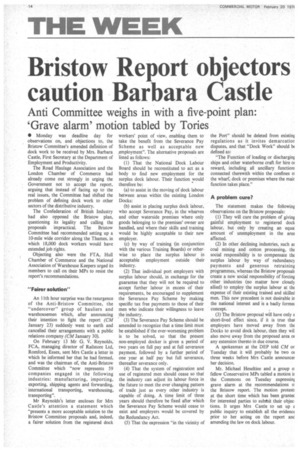Bristow Report objectors caution Barbara Castle
Page 16

If you've noticed an error in this article please click here to report it so we can fix it.
Anti Committee weighs in with a five-point plan: 'Grave alarm' motion tabled by Tories
• Monday was deadline day for observations on, and objections to, the Bristow Committee's amended definition of dock work to be received by Mrs. Barbara Castle, First Secretary at the Department of Employment and Productivity.
The Road Haulage Association and the London Chamber of Commerce had already come out strongly in urging the Government not to accept the report, arguing that instead of facing up to the real issues, the Committee had shifted the problem of defining dock work to other sectors of the distributive industry.
The Confederation of British Industry had also opposed the Bristow plan, questioning its legality and calling the proposals impractical. The Bristow Committee had recommended setting up a 10-mile wide corridor along the Thames, in which 18,000 dock workers would have extended job rights.
Objecting also were the FTA, Hull Chamber of Commerce and the National Association of Warehouse Keepers urged its members to call on their MPs to resist the report's recommendations.
"Fairer solution" An 11th hour surprise was the resurgence of the Anti-Bristow Committee, the "undercover" group of hauliers and warehousemen which, after announcing their intention to fight the report (CM January 23) suddenly went to earth and • cancelled their arrangements with a public relations company (CM January 30).
On February 13 Mr G. V. Reynolds, FCA, managing director of Railstore Ltd, Romford, Essex, sent Mrs Castle a letter in which he informed her that he had formed, and was the chairman of, the Anti-Bristow Committee which "now represents 59 companies engaged in the following industries: manufacturing, importing, exporting, shipping agents and forwarding, international transporting, warehousing, transporting".
Mr Reynolds's letter encloses for Mrs Castle's attention a statement which "presents a more acceptable solution to the Bristow Committee proposals and, indeed, a fairer solution from the registered dock workers' point of view, enabling them to take the benefit from the Severance Pay Scheme as well as acceptable new employment". The alternative proposals are listed as follows: (1) That the National Dock Labour Board should be reconstituted to act as a body to find new employment for the surplus dock labour. Their function would therefore be: (a) to assist in the moving of dock labour between areas within the existing London Docks: (b) assist in placing surplus dock labour, who accept Severance Pay, in the wharves and other waterside premises where only goods belonging to the premises' owner are handled, and where their skills and training would be highly acceptable to their new employer.
(c) by way of training (in conjunction with the various Training Boards) or otherwise to place the surplus labour in acceptable employment outside their industry.
(2) That individual port employers with surplus labour should, in exchange for the guarantee that they will not be required to accept further labour in excess of their requirements, be encouraged to supplement the Severance Pay Scheme by making specific tax free payments to those of their men who indicate their willingness to leave the industry.
(3) The Severance Pay Scheme should be amended to recognize that a time limit must be established if the ever-worsening problem is to be solved, so that the present non-employed docker is given a period of two years on full pay and at full severance payment, followed by a further period of one year at half pay but full severance, thereafter severance only.
(4) That the system of registration and use of registered men should cease so that the industry can adjust its labour force in the future to meet the ever changing pattern of trade just as every other industry is capable of doing. A time limit of three years should therefore be fixed after which the Severance Pay Scheme would cease to exist and employers would be covered by the Redundancy Act.
(5) That the expression "in the vicinity of the Port" should be deleted from odsting regulations as it invites demarcatior disputes, and that "Dock Work" should bt defined as: "The Function of loading or discharging ships and other waterborne craft for hire a reward, including all ancillary function! connected therewith within the confines a the wharf, dock or premises where the mair function takes place."
A problem cure?
The statement makes the following observations on the Bristow proposals: (1) They will cure the problem of giving gainful employment to registered dock labour, but only by creating an equal amount of unemployment in the area affected.
(2) In other declining industries, such a! coat mining and cotton processing, tilt social responsibility is to compensate tilt surplus labour by way of redundancy payments and generous retraining programmes, whereas the Bristow proposali create a new social responsibility of forcing other industries (no matter how closely allied) to employ the surplus labour at tin expense of their existing trained and skilled men. This new precedent is not desirable in the national interest and is a badly forme4 concept.
(3) The Bristow proposal will have only a short-lived effect since, if it is true ths0 employers have moved away from tin Docks to avoid dock labour, then they wi1 also move away from the proposed area oi any extension thereto in due course.
A spokesman at the DEP told CM or Tuesday that it will probably be two IN three weeks before Mrs Castle announce! her decision.
Mr. Michael Heseltine and a group o fellow Conservative MPs tabled a motion ir the Commons on Tuesday expressing grave alarm at the recommendations o the Bristow report. The motion protest: at the short time which has been grantee for interested parties to subinit their objections. It urges Mrs Castle to set up s public inquiry to establish all the evidenc( prior to her acting on the report anc amending the law on dock labour.














































































































































































































